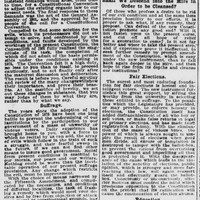-
Title
-
"Address of the Committee of the Constitutional Convention"
-
Description
-
The Committee named by the Constitutional Convention to prepare an address to the people of the State outlining the changes in the new Constitution from the organic law under which Alabama is now being governed, has issued the following.
To the People of Alabama:
The Convention lately assembled by you to amend and revise the Constitution of Alabama asks your considerate judgement upon the new instrument, and has appointed the undersigned delegates to lay before you the reasons which urge its ratification.
It is no disparagement of the wisdom or fidelity of the Convention of 1875 to declare that the proposed Constitution is far better for us than our present organic law.
PROBLEMS BEFORE THE CONVENTION OF 1875
That Convention met when the passions of the great war had not yet subsided, and sectional distrust was still acute and aggressive. The Congress of the United States, and public opinion in the dominant sections were still unconvinced that a government for the people of Alabama, controlled or directed by the suffrage of former African slaves, was neither justifiable nor possible. Our then fundamental law, framed by aliens, had been put in force by military power after its rejection at the polls. The State was burdened with direct debt, and liable for many millions of dollars lost or squandered in reckless railroad enterprises. Our people had just regained control of their State government, and were suffering from the readjustment of our system of labor and industry. It could not be foreseen whether Congress would interfere, if changes were made in the basic of suffrage. Above all things, the State needed rest.
Under such conditions, the Convention of 1875 had little freedom of action. Its members shared the opinion of the masses of the people, that beyond the adoption of a Constitution which should be the free act of Alabama, with such provisions as were absolutely necessary to prevent excessive taxation, the creation of new debts, and to enforce economy in the government, few changes should be undertaken in the organic law. Dreading Federal intervention, that Convention did not disturb the existing basis of suffrage, but felt compelled to fasten it upon us by restrictions, going far beyond the Fifteenth Amendment, forbidding "any educational or property qualification for suffrage or office." With the great question thus put aside, the task of that Convention was comparatively simple, and could be speedily accomplished.
THE GREATER TASK OF THE CONVENTION OF 1901
The relief afforded by that Constitution, in the nature of things, could only be transient, since the growing cancer of the suffrage remained untouched, while the State meanwhile was rapidly changing from agricultural pursuits to mining, manufacturing and other industries, and increasing from year to year in population and wealth. It was inevitable that insistent demands would arise, from time to time, for a Constitutional Convention to adjust the existing organic law to our present needs. The final response to these demands was the act of the General Assembly of 1901, and the approval by the people the people of the call for a Constitutional Convention.
Compelled to find some solution for the evils, which its predecessors did not attempt to solve, and confronted by new conditions, and faults developed by the workings of the present Constitution, the Convention of 1901 fully realized the magnitude of its task, the completion of which did not admit of the haste permissible under the conditions existing in 1875. The Convention felt it a high duty, no less to you than to itself, to proceed cautiously, and to act finally only after the maturest [sic] discussion and deliberation. The result is before you. Careful scrutiny and review of the many changes will show their importance, and prove their benefits. At the sacrifice of brevity, we set out these changes in substance, that you may judge of them by what they are, rather than by what we say.
SUFFRAGE
The years since the adoption of the Constitution of 1875 have been one long battle to prevent the undermining of our institutions by the participation in our government of a mass of unworthy or vicious voters. Daily experience has brought home to you, with a force to which no recital by us can add, the array of evils which follow in the train of such a struggle, and their fearful sweep in the future, if we can not find other means to insure good government. Relief from present conditions is essential to our morals, our peace and our welfare. Nothing could be worse than the inevitable operation of our present suffrage provisions. Any change which restricts the evil, must be improvement.
With the choice of means narrowed by the Fifteenth Amendment, and complicated by the necessities, and conditions of different localities, the task of framing a remedy which would meet your desires and be free from objection or attack upon moral or constitutional grounds, half not been an easy one. Your delegates have wrought as best they could, and submit the result of their labors, feeling confident that the plan submitted will purge the electorate of the unworthy and vicious voter who has so long debased our suffrage.
The Suffrage Article of the proposed Constitution provides for the registration of all voters under the present law who have honorably served their country in war, the lawful descendants of such persons, and all who are of good character and who understand the duties and obligations of citizenship under a republican form of government. This provision save to every man who vails himself of it, the privilege of suffrage for life. The result will be that the ballot will be left in the hands of those of our present voting population who have demonstrated their capacity to exercise the privilege in the interest of social order and progress...
-
Date
-
September 20, 1901
 1901-09-20.jpg
1901-09-20.jpg
